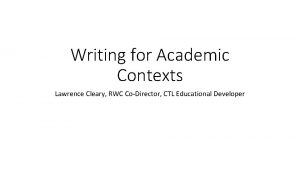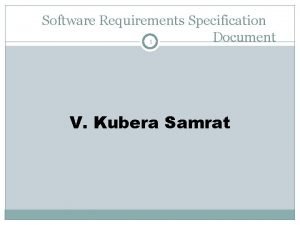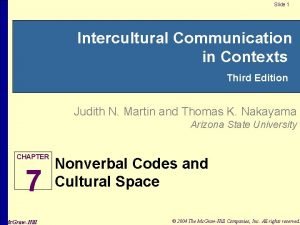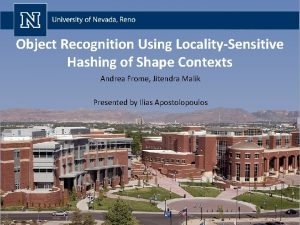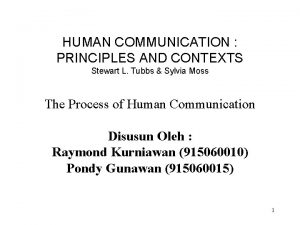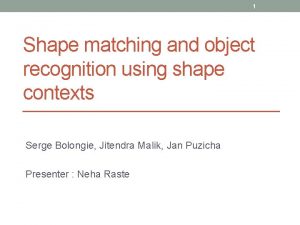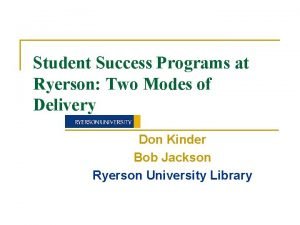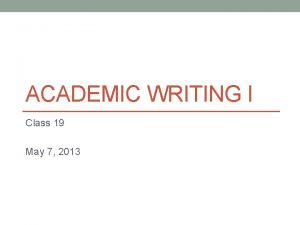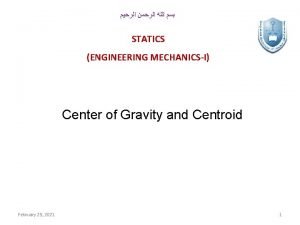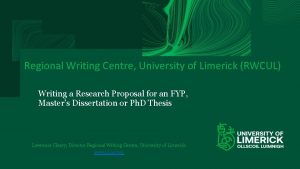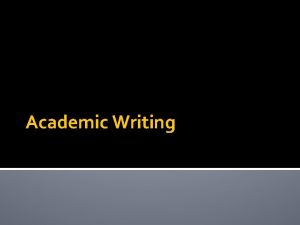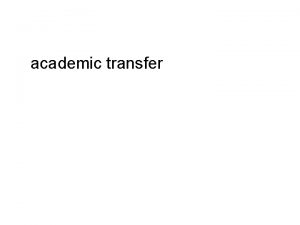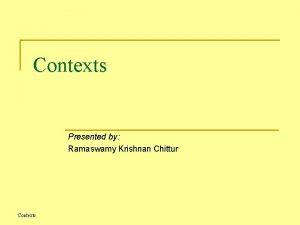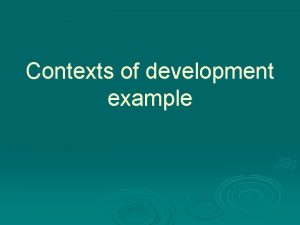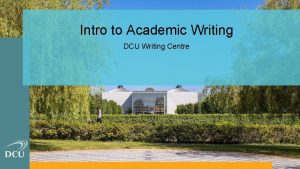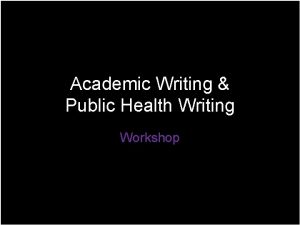Regional Writing Centre RWCUL Writing for Academic Contexts













- Slides: 13

Regional Writing Centre (RWCUL): Writing for Academic Contexts Lawrence Cleary, Director Regional Writing Centre, CTL Educational Developer

Keep it simple • Process • Strategies • Situation

Process • What you do when you are given a writing task. Writing is an act, a behaviour. • Two Parts: • First, all the things you do when you are trying to figure out what you want to say • Assessing the situation, making a plan, choosing a topic, gathering information, taking notes, drafting how • Second, all the things you do when you are trying to figure out to say it so that your audience gets it • Revising/re-seeing, editing, proofing—thinking in terms of best word choice, style choice, genre conventions, etc.

Strategies • Metacognitive—reflection and self-assessment—is it working? • Cognitive—thoughts that either motivate or de-motivate • Affective—feelings that move me forward or hinder my progress • Social—people that either facilitate my work or impede it • Procedural—what am I doing that’s working? What isn’t working?

Situation • Occasion—an academic context; a discipline-specific context; an informal writing context or a formal one • Topic—a point of contestation or a gap in the field of knowledge • All academic papers are argumentative • A claim a defence; a question answer; a problem a solution; a hypothesis a test an affirmation/negation • Audience—the person assessing the paper; the community that talks about the problem • Purpose—to get an A+; and maybe more • Writer—what am I bringing to the table that contributes/that interferes?

The WHAT of it: What we do in an academic context • It is important to know what people do in an academic context: • They try to improve their understanding of the nature of things, things being our shared realities. • They argue. • They either try to make a case that explains what is currently not well understood or • They take a position on a point of contestation. • They do this by appealing to • Your sense of reason: logos • Your trust in the person arguing: ethos • i. e. , they do good scholarly work: • Accounting for the knowledge that has be established by previous scholars, • they use sound, tried and tested methods of inquiry, accepted as valid by scholars in their field, to acquire information and to analyse that information in an effort to make sense of the new information so that they can defend what might either be new knowledge (Ph. D) or a further confirmation of what is already known (Bachelors and Masters). • i. e. they strive to move the knowledge base forward to increase our understanding of the nature of things. 06. 11. 19

The Thesis Statement • • Claim Defence Question Answer (defence of answer) Problem Solution (defence of solution) Hypothesis Test Affirmation/Negation (defence of the interpretations of the findings and the conclusions drawn)

The HOW of it: Talking the Academic Talk • Think context: • Think being a good scientist: • Ask how do respected scholars in my field think/speak/write? • Features of academic writing • Reporting on the findings of others • Expressing your own position • More of you and your position

Scaffolding the argument (logical order) • You have to bring the reader with you. Logic helps. • Flow • Logical order • Types of arguments: • Categorical or definitional arguments • Causal arguments • Resemblance arguments • Evaluation/ethical arguments • Propositional arguments • Organising the argument • Avoiding logical fallacies

Genres • http: //www. uefap. com/index. htm • https: //writingcenter. unc. edu/tips-and-tools/ • https: //owl. purdue. edu/owl/purdue_owl. html

Samples of writing for academic purposes • Engineering • Technical background report • Other types of writing by engineers • Psychology • Marketing • Literary Studies • Biology • Lab reports

Acculturating to the discourse in your field • It takes time. • People who read and write a lot tend to develop an academic voice more quickly. • Everyone should recognise that each year you will be better at figuring out what to write about and how to say the things you want to say. • Aim to be really good at it by year 4.

 Writing in academic contexts
Writing in academic contexts Writing in professional contexts
Writing in professional contexts Teachers in crisis contexts
Teachers in crisis contexts The sociological perspective stresses that
The sociological perspective stresses that The srs document is useful in various contexts:
The srs document is useful in various contexts: What does global context mean
What does global context mean Intercultural communication in contexts
Intercultural communication in contexts Shape matching and object recognition using shape contexts
Shape matching and object recognition using shape contexts Model tubbs
Model tubbs Bolongie
Bolongie Ryerson academic success centre
Ryerson academic success centre Technical writing vs academic writing
Technical writing vs academic writing Business writing vs academic writing
Business writing vs academic writing Center of gravity statics
Center of gravity statics
